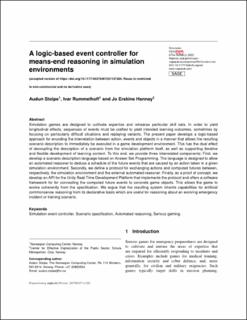| dc.contributor.author | Stolpe, Audun | |
| dc.contributor.author | Rummelhoff, Ivar | |
| dc.contributor.author | Hannay, Jo Erskine | |
| dc.date.accessioned | 2023-05-23T08:52:45Z | |
| dc.date.available | 2023-05-23T08:52:45Z | |
| dc.date.created | 2023-05-09T14:06:21Z | |
| dc.date.issued | 2023 | |
| dc.identifier.issn | 0037-5497 | |
| dc.identifier.uri | https://hdl.handle.net/11250/3068625 | |
| dc.description.abstract | Simulation games are designed to cultivate expertise and rehearse particular skill sets. In order to yield longitudinal effects, sequences of events must be crafted to yield intended learning outcomes, sometimes by focusing on particularly difficult situations and replaying variants. The present paper develops a logic-based approach for encoding the interrelation between action, events and objects in a manner that allows the resulting scenario description to immediately be executed in a game development environment. This has the dual effect of decoupling the description of a scenario from the simulation platform itself, as well as supporting iterative and flexible development of learning content. To this end, we provide three interrelated components: First, we develop a scenario description language based on Answer Set Programming. The language is designed to allow an automated reasoner to deduce a schedule of the future events that are caused by an action taken in a given simulation environment. Secondly, we define a protocol for exchanging actions and computed futures between, respectively, the simulation environment and the external automated reasoner. Finally, as a proof of concept, we develop an API for the Unity Real-Time Development Platform that implements the protocol and offers a software framework for for connecting the computed future events to concrete game objects. This allows the game to evolve coherently from the specification. We argue that the resulting system inherits capabilities for artificial commonsense reasoning from its declarative basis which are useful for reasoning about an evolving emergency incident or training scenario. | en_US |
| dc.description.abstract | A logic based event controller for means-end reasoning in simulation environments | en_US |
| dc.language.iso | eng | en_US |
| dc.rights | Navngivelse-Ikkekommersiell-DelPåSammeVilkår 4.0 Internasjonal | * |
| dc.rights.uri | http://creativecommons.org/licenses/by-nc-sa/4.0/deed.no | * |
| dc.title | A logic based event controller for means-end reasoning in simulation environments | en_US |
| dc.title.alternative | A logic based event controller for means-end reasoning in simulation environments | en_US |
| dc.type | Journal article | en_US |
| dc.description.version | acceptedVersion | en_US |
| cristin.ispublished | true | |
| cristin.fulltext | postprint | |
| cristin.qualitycode | 1 | |
| dc.identifier.doi | 10.1177/00375497231157384 | |
| dc.identifier.cristin | 2146471 | |
| dc.source.journal | Simulation (San Diego, Calif.) | en_US |
| dc.relation.project | Norges forskningsråd: 329062 | en_US |
| dc.relation.project | Norges forskningsråd: 282081 | en_US |

